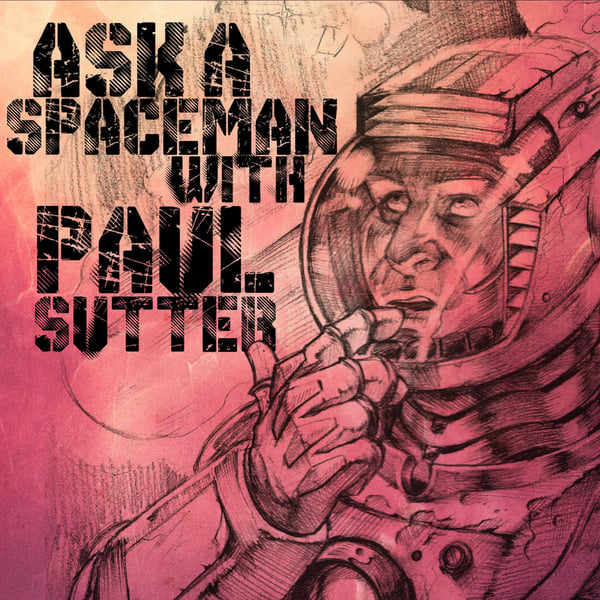AaS! 73: Why Should We Believe The Big Bang?
Ask a Spaceman!
Paul M. Sutter
4.8 • 853 Ratings
🗓️ 6 February 2018
⏱️ 31 minutes
🧾️ Download transcript
Summary
What did Hubble really discover? Why does redshift imply an expanding universe? Why is the night sky dark? Why is there so much hydrogen, and how is that connected to the Big Bang? I discuss these questions and more in today’s Ask a Spaceman!
Support the show: http://www.patreon.com/pmsutter
All episodes: http://www.AskASpaceman.com
Watch on YouTube: http://www.youtube.com/PaulMSutter
Read a book: https://www.pmsutter.com/books
Keep those questions about space, science, astronomy, astrophysics, physics, and cosmology coming to #AskASpaceman for COMPLETE KNOWLEDGE OF TIME AND SPACE!
Big thanks to my top Patreon supporters this month: Robert R., Justin G., Matthew K., Kevin O., Justin R., Chris C., Helge B., Tim R., SkyDiving Storm Trooper, Steve P., Lars H., Khaled T., John F., Mark R., and David B.!
Music by Jason Grady and Nick Bain. Thanks to WCBE Radio for hosting the recording session, Greg Mobius for producing, and Cathy Rinella for editing.
Hosted by Paul M. Sutter, astrophysicist at The Ohio State University, Chief Scientist at COSI Science Center, and the one and only Agent to the Stars (http://www.pmsutter.com).
Transcript
Click on a timestamp to play from that location
| 0:00.0 | Imagine Edwin Hubble's surprise when he learned that we live in an expanding universe. |
| 0:13.0 | I mean, what a big deal that was. |
| 0:16.7 | It's so hard for me to express how much of a change that one set of observations, that one |
| 0:25.9 | conclusion, that one paper that he published, that he presented changed everything. |
| 0:34.0 | This period when Hubble was operating in the early 20th century is so fascinating to me, and that means we're going to talk about it because it's my show, because it contrasts the physical cosmology that we have now, our view of the universe, its history, its contents through the lens of physics, |
| 0:55.7 | to the cosmologies, both physical cosmology and other spiritual, |
| 1:01.1 | let's call them spiritual cosmologies of the past. |
| 1:04.3 | And there's so many creation stories and thoughts. |
| 1:09.2 | People have been thinking about the universe at large scales ever since |
| 1:13.4 | there's been people to think thoughts, basically. And there's so many ideas, there's so many |
| 1:18.4 | stories. It's impossible to catalog them all in the brief time that we have together. But in my |
| 1:25.3 | mind, there are two broad categories of creation myths. One are the |
| 1:29.7 | linear ones where boom, the universe started, and then the universe is doing his thing right now, |
| 1:34.6 | and then boom, the universe will end. Or they're the cyclical ones where the universe, in some |
| 1:40.5 | sense, has always existed, but there have been endless cycles of death and rebirth. |
| 1:46.0 | And one thing that strikes me, and I could be wrong, so feel free to send me examples otherwise, |
| 1:52.1 | is that no matter the story, no matter the tradition, the universe is. |
| 1:58.6 | It's just always there. |
| 2:00.6 | Here on Earth, we have messy lives and complicated lives. |
| 2:05.0 | Sometimes the god or gods mess with us in these stories. But the larger cosmos is just |
| 2:11.9 | the cosmos. It's just there. It's just hangs out above us doing its thing, not really changing over time. |
| 2:21.6 | It might go through cyclical, like where the whole universe ends and then begins again or ends and then that's it. |
... |
Please login to see the full transcript.
Disclaimer: The podcast and artwork embedded on this page are from Paul M. Sutter, and are the property of its owner and not affiliated with or endorsed by Tapesearch.
Generated transcripts are the property of Paul M. Sutter and are distributed freely under the Fair Use doctrine. Transcripts generated by Tapesearch are not guaranteed to be accurate.
Copyright © Tapesearch 2025.

